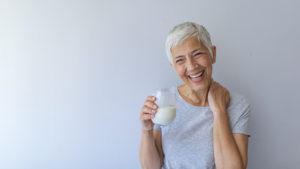
The results of the study, published in the journal of The North American Menopause Society (NAMS), shows that as women enter the menopause transition, the nutrients found in milk are of little help to bone health. Children are often encouraged to drink milk because of the various essential nutrients found in dairy that promote bone mineralization, including calcium, phosphorus, vitamin D, and high-quality protein. But according to SWAN data, these beneficial nutrients that are helpful in younger people do not slow down the bone loss in older women.
For the study, researchers looked specifically at the effects of dairy intake on femoral and spine bone mineral density. It is one of only a few studies dedicated to examining how a women’s risk of bone loss and fractures during menopause is related to dairy consumption. As age and sex are the two greatest risk factors for bone loss in women and cannot be controlled, there has been an increased focus of possible modifiable risk factors to slow bone loss.
“This study adds to the existing, albeit inconsistent, data suggesting a lack of benefit from dairy intake on bone mineral density and fracture risk. However, there are many other health benefits of a Mediterranean-type diet rich in fruits, vegetables, and whole grains, as well as lean protein such as fish and low-fat dairy. In addition, regular weight-bearing exercise, such as walking or jogging, can help maintain bone strength, and activities that improve strength and balance, such as yoga and tai chi, may help prevent falls,” says Dr. Stephanie Faubion, NAMS medical director.
A Decrease in Bone Density
Osteoporosis is a condition characterized by a decrease in the density of bone, decreasing its strength and resulting in fragile bones. It can cause a great deal of suffering, including loss of independence, which is why it is so important to build up the density of the bones as much as possible. But, as this research shows, consuming dairy is not going to help if you have been diagnosed with bone disease.
While dairy products provide more bone-beneficial nutrients than any other food group, there are other ways to help protect bones later in life. Many vitamins and minerals have been shown to help women who are suffering from bone loss due to osteoporosis. Many lifestyle changes can affect bone density. These include quitting smoking, weight-bearing exercise, and eating a healthy diet.